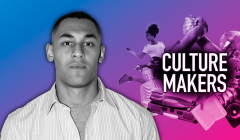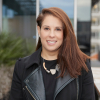
‘Subculture is the most powerful tool we have’
Louis Persent, Co-Founder and Creative Director at Weirdo on the power of embracing the niche

The region’s most senior leaders offer their advice and support around empathetic leadership, the challenges women face in the industry and the responsibility of being a role model.
NABS, the support organisation for advertising and media, has a strong presence in the north of England. NABS’ Manchester committee makes sure that everyone in the region knows about its work. Some of the region’s most senior leaders sit on the committee, including Carolina Gutierrez, Client Services Director at The&Partnership, Nicola Marsh, MD MediaCom Manchester and Natalie Marshall-Foxwell, Managing Partner at PHD. Together with NABS’ Regional Director Kate Harris, also MD of Harris Talent, the four talk about leadership, being female in the industry, opportunities in the region and of course wellbeing.



Demonstrating from the top down that it is OK to not be OK is important.
Carolina Gutierrez
KH: Empathy is so important. You have to treat people like humans. I make sure that I listen to people and help them wherever I can, whether that’s in my role at NABS or in my recruitment business, Harris Talent. It doesn’t matter what level someone is at; as a leader, you treat them with kindness and decency.
NM-H: What we’ve undoubtedly seen play out this year on the world stage is honesty, agility and empathy as the most important skills for effective leadership in a crisis, and important skills at any time. I think the qualities needed to help ourselves and the people around us navigate all the uncertainty are really no different.
CG: Empathy has been critical this year. COVID has impacted each and every one of us differently. Leaders have had to flex our empathy and understanding muscles more than ever. Whether it’s the working parent who has had to change their hours to accommodate childcare, or the employee who lives on their own and requires more frequent check-ins, we’ve had to be cognisant of and adapt to everyone’s personal circumstances to ensure we keep the whole team motivated and engaged.
There’s also the power of vulnerability. The impact of change and uncertainty on mental health cannot be underestimated. Demonstrating from the top down that it is OK to not be OK is important. Clear, honest and regular communication is key.
NM: We’re navigating through unprecedented times. In the current climate there isn’t a leader who can use their experience of the situation to dictate the best way forward. You need to be strong, decisive and adaptable during times of uncertainty. Visibility is key, especially as most of us are working from home. Listening to others, acknowledging how people are feeling and being open about your own feelings are important. Sharing your experiences and being human helps people to be honest about how they’re feeling. It shows that the decision-makers in the business are empathetic and in touch with people.
Moving fast enough, but making sure that change doesn’t become too disruptive, is a delicate balancing act.
Nicola Marsh
KH: There are some fantastic female leaders out there but it’s still a challenge to have our voices heard beyond the usual things associated with being female, as hugely important as those issues are. I’m encouraged though that there are female leaders who are loudly championing other key issues, like D&I; Karen Blackett is an absolute beacon. And I’m really pleased that we have so many female leaders at NABS.
NM-F: There are many common challenges faced by leaders and aspiring leaders in our industry. One of the things that I am most vocal about is the enormous job of combining working with parenting, or other caring responsibilities. This is something that absolutely affects both men and women of course, but I think the picture is a little more nuanced for women. And this seems to be one of the forces driving the disparities in the gender pay gap across the industry.
CG: I’ve had to learn to be authentic. I’m not sure that this is gender-specific but finding your own leadership style is important. I used to think I had to be loud, big and fun but that just isn’t me. I had to learn to be comfortable with wanting to be gentler, more nurturing, quieter even. It won’t be any less effective.
NM: Leaders in our industry all face the same challenges. We’re experiencing a huge change in the way we work, the way we buy media and the way consumers are behaving. As a consequence, we’re having to change the way we work and the services we offer to clients and we’re having to develop new skillsets. The pace of change is quick, and the challenge is keeping up with that change. It’s an exciting and interesting time that presents challenges and opportunities. Moving fast enough, but making sure that change doesn’t become too disruptive, is a delicate balancing act.
Be a mentor, be a sponsor, actively support talented women.
Kate Harris
KH: I’ve been really lucky because I’ve had some fantastic mentors. Mentoring is really important and especially for me because I came up through the industry in an unconventional way. It was my fantastic mentors who helped my career to progress. So, be a mentor, be a sponsor, actively support talented women. Give them opportunities and enable them with the confidence to seize those opportunities.
NM-F: I think we’re pretty lucky at an industry level with the support and resources we have available, though we’ve found awareness of what’s out there can sometimes be low. NABS Masterclasses are a fantastic example of supporting leaders and aspiring leaders. Whilst not exclusive to women, the themes are certainly of particular interest, for example building confidence and gravitas, and building better habits as a working parent.
CG: I’ve been very fortunate in my career; I’ve never felt that my gender has been a barrier. Having said that, that isn’t the case for many. When I reflect on how my current and previous employers have supported me, the common theme is that they have fundamentally believed in me. I’ve felt backed, supported, and well-trained. I’ve been thrown in the deep end but never without a lifeboat to reach out to for support. Believe in women and you will be rewarded in spades.
NM: We’re lucky to some degree as there’s been a huge shift in awareness around what women need to succeed in this industry. In addition to agency initiatives like the WPP woman in leadership programme, there are some great female networks such as WACL and Bloom that support women with content, a network and a way to share experiences.
The talent of the industry will gravitate towards the companies that lead with a more human touch.
Natalie Marshall-Foxwell
KH: We’ve got some outstanding female leaders in the north; just look at Natalie, Carolina and Nicole for a start. The task for the industry is to keep the momentum going. We need to keep encouraging women from all backgrounds to step into leadership roles, not just in the north of course, but nationally.
NM-F: I don’t think it’s specific to either gender or geography, but I am hopeful one positive legacy of COVID will be an acceleration of and a more level playing field around flexible working. Most people, regardless of their gender or personal responsibilities, will look to find a healthier balance around how and where they when we emerge from all this. I have no doubt the talent of the industry will gravitate towards the companies that lead with a more human touch, embracing the opportunities that come with rethinking how we work.
CG: I don’t believe our industry is set up for working mothers with its long days and being at the disposal of your clients more hours than not. As a result, we see many women at the top of their game gracefully bow out because they feel they can’t or don’t want to work the hours demanded. As a junior female in the industry, I didn’t see many senior women to aspire towards. Thankfully this is changing so I hope the women entering the industry today get a different picture to the one I saw.
Addressing the work-all-hours culture of this industry will be important for changing this long-term. I hope if anything positive is to be realised from the global pandemic, it’s that our working lives can look very different in terms of remote working and flexibility, while still seeing the same if not better results. This positive change will make it easier to manage work and personal lives as opposed to a constant juggling act.
NM: Whilst we’re making great strides and seeing more and more female leaders in the regions, I would still like to see more females in technical and digital roles. This is more about how we can attract talent at a grassroots level as well as how we develop this talent through the agency.
Acknowledging vulnerabilities is a show of strength, not weakness.
Natalie Marshall-Foxwell
KH: By practicing what I preach. At NABS, we talk about wellbeing, the importance of looking after yourself, and I try to do that and share what I do with the team. It’s also important to talk about your experiences, good and bad. It’s what makes you human, and empowers others to be themselves. We’re all unique and that’s what makes this industry so interesting, to have so many different people working within it.
NM-F: I try and be as open, honest and accessible to people as I can be. The leaders who have inspired me most, both in our industry and public life more generally, have been honest about their own struggles and challenges along the way, particularly with sensitive issues like staying mentally fit, and the pressures that come with combining careers with parenting. For a long time, it felt like no-one was talking about how hard these things are, which can leave you with a sense that you’re failing, or you haven’t got what it takes. Acknowledging vulnerabilities is a show of strength, not weakness.
CG: Supporting women and men to succeed equally. Mentor other women. Make them aware of their gender biases and encourage them to push up the ladder of their chosen paths. Be there to support men and women alike.
NM: Authenticity is one of the most important things to me personally. Hopefully people who work with me can see that I have got to my position by working hard and being myself. I’ve dedicated a huge amount of time to furthering the female agenda in the business and the wider community and hopefully this sends an important message about supporting and championing each other.
It’s crucial that every person in the industry knows what NABS does and that we’re here for them.
Kate Harris
KH: I’m really passionate about NABS. It’s one of the most important organisations in the industry and we’re all so fortunate to have it to support us. It’s crucial that every person in the industry knows what NABS does and that we’re here for them. It’s my passion for NABS that helps me to get people along on the journey with us. I also try to live NABS’ core values of empathy and kindness in my work; these are non-negotiable for leadership.
NM-F: I’m a huge advocate of NABS. When I was going through a difficult time in my life and at a bit of a crossroads, NABS coaching had an enormous impact on me, even in one session! It made a real difference speaking to someone who understands the joys and the pressures of this industry. We’re incredibly lucky to have this support, and I want to make sure the word is spread far and wide.
CG: NABS is a hugely valuable and underestimated resource in our industry so I am very happy to be able to support them. I am passionate about people development and helping people to thrive, so I hope I can bring those skills to the fore by mentoring and supporting those who seek help from NABS.
NM: NABS is a fantastic organisation and the main aim for me is to ensure that more people are aware of and can access their services. NABS are facing challenges like everyone else. Finding new ways to fundraise or run events to maximise impact in these changing times is vital. The adaptability required in my day job is also required in the role I have at NABS. More and more interactions are based online; understanding how we can capitalise on the change is important.
We need to provide the north with better access to these opportunities so that clients start to see the area as an equal and level playing field to our London counterparts.
Carolina Gutierrez
KH: The digital industry is thriving and growing, so much so that we’re running to keep up with them. NABS wants to give them more support and that’s an exciting goal for us for next year. We want digital and tech to know that we’re there for them. Look at the BBC in Salford, Channel 4 in Leeds. These are really good, strong things happening outside London, and areas where NABS can support people.
NM-F: I’ve been lucky enough to have spent just over half my career in London and the other half in Manchester. Two amazing cities. Our client base at PHD Manchester is national and international brands, as it is in London, so I’m not sure about the using term ‘regional’. But, there is certainly a spirit that is uniquely and eternally Manchester: entrepreneurial, innovative, ‘can do’. It was amazing to see how much progress and growth there had been in the time I was away. And the number of people moving up here, or returning home, just goes to show it’s the place to be!
CG: Manchester and the north-west are bursting with fantastic and ambitious talent. However, our industry is very London-centric and as a result, a lot of the training and networking events and award ceremonies take place in the capital. We need to provide the north with better access to these opportunities so that clients start to see the area as an equal and level playing field to our London counterparts.
We’re seeing more people moving out of London into the regions. There’s going to be growth here.
Kate Harris
KH: Not so much in terms of your leadership qualities, but there are some exciting opportunities and a great culture in the north. Manchester, although it’s big, does feel like a closer community. There’s such a sense of warmth and pride in this part of the country. It gives the industry strength. And the creative standards are so high. A lot of agencies I work with in my recruitment business regularly pitch, and win, against London agencies. What’s more, we’re seeing more people moving out of London into the regions. There’s going to be growth here.
NM-F: In short, no. See my answer above.
CG: Being a leader is similar regardless of where you are, but the pressures feel different. London agencies tend to be bigger with bigger clients and it feels very competitive. Running a smaller business in the north brings its own set of challenges, but it feels warmer and has a strong sense of camaraderie in the industry as a whole.
NM: I don’t work in other parts of the UK so it’s quite hard to answer that question. However, I can say that being a female leader in the north is a very positive experience. There are many other female leaders and a very supportive network outside of your own organisation.
The basics are the same, whether that’s regularly and informally checking in with people, running social activities, or sharing tips, resources and materials to support with mental fitness.
Natalie Marshall-Foxwell
KH: I have a small team of one and she’s fantastic. it works because it’s an equal relationship based on trust where we work to each other’s strengths. To support her wellbeing, I make sure she sees a clear line of progression in her career, as she’s ambitious. This makes a huge difference to her and makes her fulfilled in her work. I’m also very open and allow her to download and tell me if anything is bugging her, and I give her time out when she needs it. Working from home has actually brought us closer to teammates in London, with our regular video calls, and I’ve been able to support other colleagues too. And we have a laugh! That’s crucial.
To look after my own wellbeing, I exercise a lot. I live in the country and I’m lucky to have the beautiful outdoors for my daily 10,000 steps. I don’t sleep that well, a hangover from the menopause, but I do have a healthy diet and make sure that I get some time for myself every day. Find a passion outside of work to get involved with; mine is learning Italian. It forces me away from my two jobs and uses my brain in other ways.
NM-F: ‘What can we be doing to support people?’ is a fundamental and always-on focus of leadership for us. We’ve had to innovate and adapt how we do things this year, as everyone has, for a more online world, but the basics are the same, whether that’s regularly and informally checking in with people, running social activities, or sharing tips, resources and materials to support with mental fitness. I am a mother of two kids under five, so it has been an intense year! But I’ve learned the hard way the importance of looking after myself, in whatever form that might take. A bit of yoga, a glass of wine with my husband, and a good walk with a podcast are the little things currently keeping me sane.
CG: It’s important to invest in my personal wellbeing, both physically and mentally, to keep my batteries charged to support everyone else. We encourage a healthy work-life balance and monitor workloads to ensure people have manageable work hours. We encourage the team to get out during the day to get their exercise in or to manage their work hours according to their needs. We also encourage an open and transparent relationship so everyone feels they can speak up and put their hand up if they need any help. Wherever possible, we try to be flexible to their needs, whether that’s time off for personal reasons, additional training or a career shift.
NM: I’m extremely lucky to work for a company that puts people at the heart of their business. The initiatives across mental health and D&I are fantastic. Mediacom runs an internal programme to train colleagues to be mental health allies, which is a great initiative, ensuring we provide a solid framework of support for all of our colleagues.
Looking after your own wellbeing is so important. I realised many years ago that having some time for myself where I can switch off is a necessity, not a nice to have. Horse riding and being out in the countryside really help to clear my head and give me something else to focus on. You can’t ride and think about work at the same time. My other big passion is music, a good dance is great for the soul!
Find out more about how NABS can support you and your teams at nabs.org.uk
Looks like you need to create a Creativebrief account to perform this action.
Create account Sign inLooks like you need to create a Creativebrief account to perform this action.
Create account Sign in